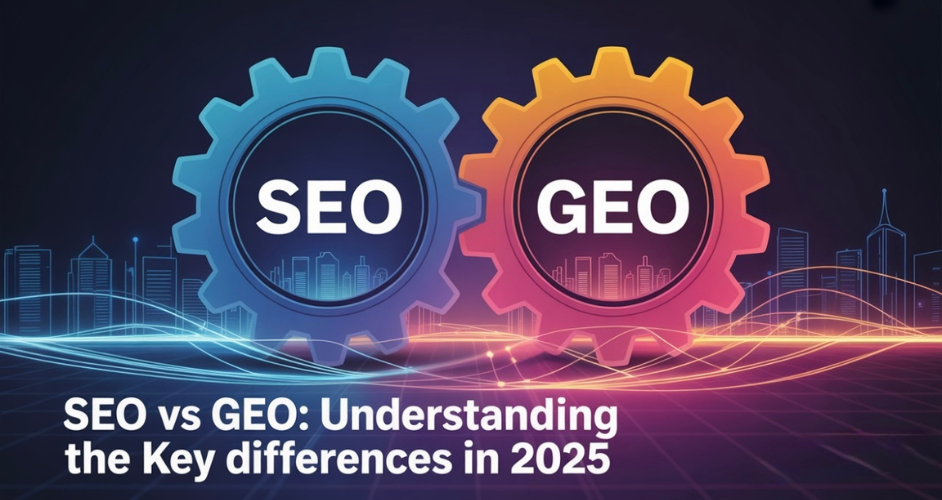Whenever we wanted to search something, our focus was always on one thing– Google. You optimized your site, moved up the ladder and waited for clicks. But 2025 has a different feel. AI is here and altering the way humans discover, evaluate and choose brands.
This is where GEO (Generative Engine Optimization) steps in. If SEO is focused on ranking links within Google, GEO is focused on earning mentions within AI answers from all generative tools like ChatGPT, Perplexity and Gemini.
Let’s discuss what SEO and GEO are about and their key differences.
What is SEO?
Search Engine Optimization (SEO) refers to manipulating your website for visibility on Google and Bing search engines. The main aim is to get your site clicked on by traffic via SERP (Search Engine Results Pages) out there.
SEO strategies include:
- Keyword research: through keywords, finding what people search for.
- On-page SEO: writing helpful, intent-driven content.
- Off-page SEO: earning trusted backlinks.
What is GEO?
Generative Engine Optimization (GEO) (also referred to LLMO) is the process of optimizing your brand for AI search engines. Rather than wanting to receive links on a results page, you want your brand to be cited or referenced in AI-driven answers.
AI platforms like ChatGPT, Google AI Overviews and Perplexity do not always drive traffic to your website directly. Many answers end in a zero-click search, where the AI provides the answer right away. But when they do cite you, that visibility builds trust, authority and higher conversion intent.
GEO strategies include:-
- Structured content: Use headings and Q&A.
- Third-party mentions: Get featured on industry sites, lists and review platforms.
- Fresh content: Keep pages updated, AI favors updated and fresh information.
- Multi-platform presence: Be active on YouTube, Reddit and forums, AI pulls heavily from them.
Key Differences SEO vs GEO
- Links vs Mentions
In SEO, success is measured as the result of your website ranking as a clickable link, based on general behavior in search results, in GEO, it is not always about clicks– when a user sees your brand in answer generated by AI, whether or not it results in clicks, it is a win for your brand.
- Browsing vs Intent
When users get SEO traffic, typically that user is going to have a browsing session, where they’ll explore multiple pages, while they are doing their research. Based on these, with GEO, you will see fewer visits, but there will probably be a higher intent, because the user coming from AI, has already established they know what they want.
- Click Journeys vs Zero-Click Searches
Traditional SEO is based on users clicking the link, landing on the site and then browsing. GEO, at times, gives users what they need directly from AI, which can result in zero-click repairs.
- Your Site vs Third-Party Sources
When we think of SEO, your website is one of the most important assets your brand ranks. With GEO, AI assistants rely heavily on third-party mentions, like media coverage, forums, reviews, and industry publications, to develop the response to the question asked.
What are the similarities between SEO and GEO?
It’s not that both of them are different but have almost alike properties:-
- Search Intent: Whether Google or ChatGPT, users want clear, useful answers.
- Content: Both rely on high-quality, authoritative content.
- Trust and reputation: The more your brand is cited, the more visible you become.
Final thoughts
SEO isn't going any time soon, but it’s not all of the story anymore. With the emergence of GEO in 2025, brands have an opportunity to think differently about how they get discovered in the age of an artificial intelligence-first internet. The most successful companies won't pick this/that, they'll excel at SEO to capture traditional searches, but also leverage GEO to become the answer on AI dominated search results.
Are you investing in both? If not, then what are you waiting for?
Now is the time to start.
